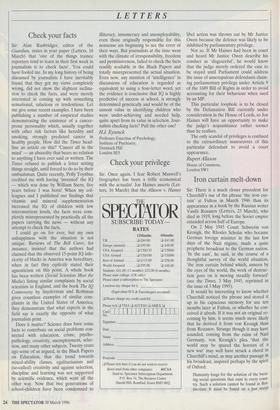LETTERS Check your facts
Sir: Alan Rusbridger, editor of the Guardian, states in your paper (Letters, 16 March) that 'one of the things trainee reporters tend to learn in their first week in journalism is to check facts'. You could have fooled me. In my long history of being discussed by journalists I have inevitably found that they got my views completely wrong, did not show the slightest inclina- tion to check the facts, and were merely interested in coming up with something sensational, salacious or tendentious. Let me give some recent examples. I have been publishing a number of empirical studies demonstrating the existence of a cancer- prone personality which, usually together with other risk factors like heredity and smoking, strongly predicted cancer in healthy people. How did the Times head- line an article on this? 'Cancer all in the mind' — an absurdity that bears no relation to anything I have ever said or written. The Times refused to publish a letter setting things straight, until forced to do so by their ombudsman. Quite recently, Polly Toynbee credited me with having 'invented' the IQ — which was done by William Stern, five years before I was born! When my col- leagues and I published our findings that vitamin and mineral supplementation increased the IQ of children with low micronutrient levels, the facts were com- pletely misrepresented by practically all the papers carrying the news — without any attempt to check the facts.
I could go on for ever, but my own unhappiness with the situation is not unique. Reviews of The Bell Curve, for instance, insisted that the authors had claimed that the observed 15-point IQ infe- riority of blacks in America was hereditary, when in fact they explicitly stated their agnosticism on this point. A whole book has been written (Social Scientists Meet the Media) listing similar complaints by social scientists in England, and the book The IQ Controversy by Snyderman and Rothman gives countless examples of similar com- plaints in the United States of America; they demonstrate that what experts in the field say is exactly the opposite of what journalists print. Does it matter? Science does have some facts to contribute on social problems con- nected with education, crime, psycho- pathology, creativity, unemployment, selec- tion, and many other subjects. Twenty years ago some of us argued, in the Black Papers on Education, that the trend towards mixed-ability classes, egalitarianism and (so-called) creativity and against selection, discipline and learning was not supported by scientific evidence, which went all the other way. Now that two generations of school-children have been condemned to illiteracy, innumeracy and unemployability, even those originally responsible for this nonsense are beginning to see the error of their ways. But journalists at the time went with the climate of irresponsibility, freedom and permissiveness, failed to check the facts readily available in the Black Papers and totally misrepresented the actual situation. Even now, any mention of 'intelligence' in discussions of education is regarded as equivalent to using a four-letter word, yet the evidence is conclusive that IQ is highly predictive of success at school, is strongly determined genetically and would be of the utmost value in identifying children who were under-achieving and needed help, quite apart from its value in selection. Jour- nalists checking facts? Pull the other one! Hi. Eysenck
Professor Emeritus of Psychology, Institute of Psychiatry, Denmark Hill London SE5


























































 Previous page
Previous page